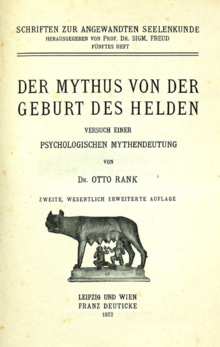The Myth of the Birth of the Hero
 Cover for the 1922 German edition | |
| Author | Otto Rank |
|---|---|
| Original title | Der Mythus von der Geburt des Helden |
| Translator |
|
| Language | German |
| Published |
|
| Publication place | Germany |
The Myth of the Birth of the Hero (German: Der Mythus von der Geburt des Helden) is a book by Austrian psychoanalyst Otto Rank in which the author puts forth a psychoanalytical interpretation of mythological heroes, specifically with regard to legends about their births.[1] The first edition of the book was published in 1909, and a greatly expanded second edition was published in 1922.[2]
Summary
[edit]The Myth of the Birth of the Hero comprises three parts (the first two sections were originally published in 1909, and the final section was added when the work was republished in 1922). In the first section, Rank introduces his topic of investigation, noting: "Whatever one’s opinion as to their origin, one is struck by an insistent tendency in the myths to make all heroic figures fit the framework of a specific birth legend."[3] He then emphasizes "the role played by unconscious psychosexual life in myth formation."[1] In the work's second section, Rank closely analyzes mythes about the births of Sargon of Akkad, Moses, Karna, Oedipus, Paris, Telephos, Perseus, Dionysus, Gilgamesh, Cyrus the Great, Trakhan, Tristan, Romulus, Hercules, Jesus, Sigurd, Lohengrin, and Sceafa.[4] In the final section, Rank lays out a rough outline that he claims can be applied to almost all mythical birth stories:
The hero is the child of very distinguished parents, and usually the son of a king. His origin is preceded by difficulties, such as sexual abstinence, prolonged infertility, or secret intercourse of the parents due to external prohibition or obstacles. During or before the pregnancy, a prophecy, in the form of a dream or oracle, warns against his birth, usually threatening harm to the father. Therefore the newborn child, usually at the instigation of the father or his representative, is doomed to be killed or exposed. As a rule, he is surrendered to the water, in a box. He is then saved by animals, or by lowly people (herders), and suckled by a female animal or a lowly woman. After he has grown up, he finds his distinguished parents in a variety of ways. He takes revenge on his father, on the one hand, and is acknowledged, on the other, achieving greatness and fame.[5]
Publication history
[edit]The first edition of The Myth of the Birth of the Hero was published in 1909 by Franz Deuticke.[6] An English translation of this edition (translated by E. Robbins and Smith Ely Jelliffe) was later issued in 1914 as an eighteenth entry in the "Nervous and Mental Disease" monograph series by the Nervous and Mental Disease Publishing Company.[7] An expanded second edition was published in German by Franz Deuticke in 1922.[8] This edition remained officially unavailable in English until 2004, when a version translated by Gregory C. Richter and E. James Lieberman was published by the Johns Hopkins University Press.[9]
See also
[edit]- Joseph Campbell's Hero with a Thousand Faces (1949)
- James George Frazer's The Golden Bough (1890–1915)
- The Rank–Raglan mythotype
References
[edit]- ^ a b Kaës, René (2005). "Myth of the Birth of the Hero, The". In de Mijolla, Alain (ed.). The International Dictionary of Psychoanalysis. Detroit, MI: Macmillan Reference USA. pp. 1093–1094.
- ^ Segal, Robert A. (2004). "Introductory Essay". The Myth of the Birth of the Hero: A Psychological Exploration of Myth. Baltimore, MA: Johns Hopkins University Press. p. viii, xxviii.
- ^ Rank, Otto (2004). The Myth of the Birth of the Hero: A Psychological Exploration of Myth. Baltimore, MA: Johns Hopkins University Press. p. 4.
- ^ The first edition does not include the stories of Dionysus and Trakhan. See: Segal, Robert A. (2004). "Introductory Essay". The Myth of the Birth of the Hero: A Psychological Exploration of Myth. Baltimore, MA: Johns Hopkins University Press. p. viii, xxviii.
- ^ Rank, Otto (2004). The Myth of the Birth of the Hero: A Psychological Exploration of Myth. Baltimore, MA: Johns Hopkins University Press. p. 47.
- ^ Rank, Otto (1909). Der Mythus von der Geburt des Helden: Versuch einer psychologischen Mythendeutung (in German) (1st ed.). Leipzig: Franz Deuticke – via Google Books.
- ^ Rank, Otto (1914). The Myth of the Birth of the Hero: A Psychological Interpretation of Mythology. Translated by Robbins, E.; Jelliffe, Smith Ely (1st ed.). New York City: Nervous and Mental Disease Publishing Company – via Google Books.
- ^ Rank, Otto (1922). Der Mythus von der Geburt des Helden: Versuch einer psychologischen Mythendeutung (in German) (2nd ed.). Leipzig: Franz Deuticke – via The Internet Archive.
- ^ Rank, Otto (2004). The Myth of the Birth of the Hero: A Psychological Exploration of Myth. Translated by Richter, Gregory C.; Lieberman, E. James (Expanded and updated ed.). Baltimore, MA: Johns Hopkins University Press.
- Psychology book stubs
- 1909 non-fiction books
- 1922 non-fiction books
- Books about psychoanalysis
- Books by Otto Rank
- Comparative mythology
- German non-fiction books
- Mythology books
- Religious studies books
- Sargon of Akkad
- Cultural depictions of Moses
- Dionysus
- Cultural depictions of Gilgamesh
- Cultural depictions of Cyrus the Great
- Tristan and Iseult
- Cultural depictions of Romulus and Remus
- Hercules
- Depictions of Jesus in literature
- Works about childbirth
